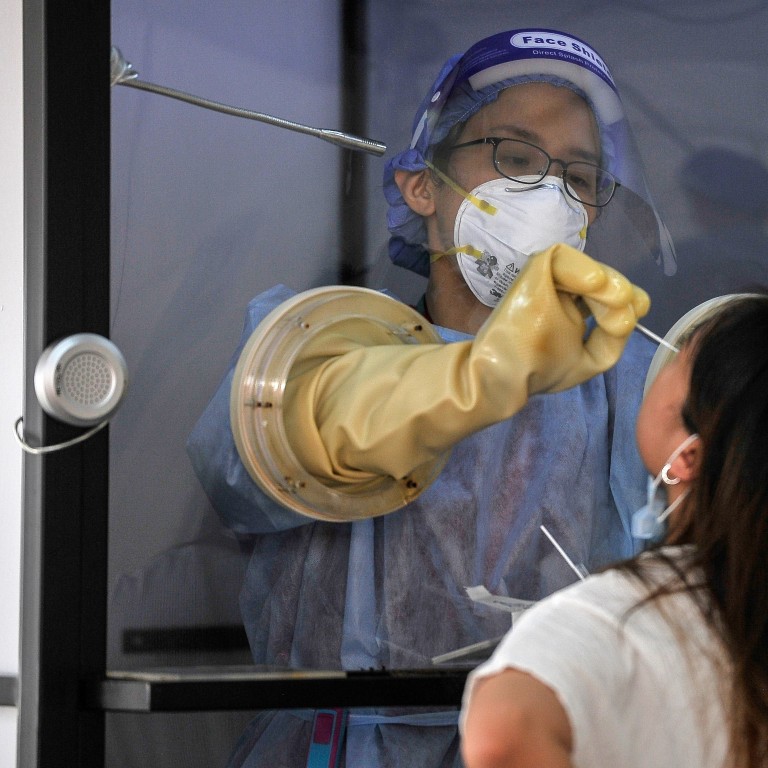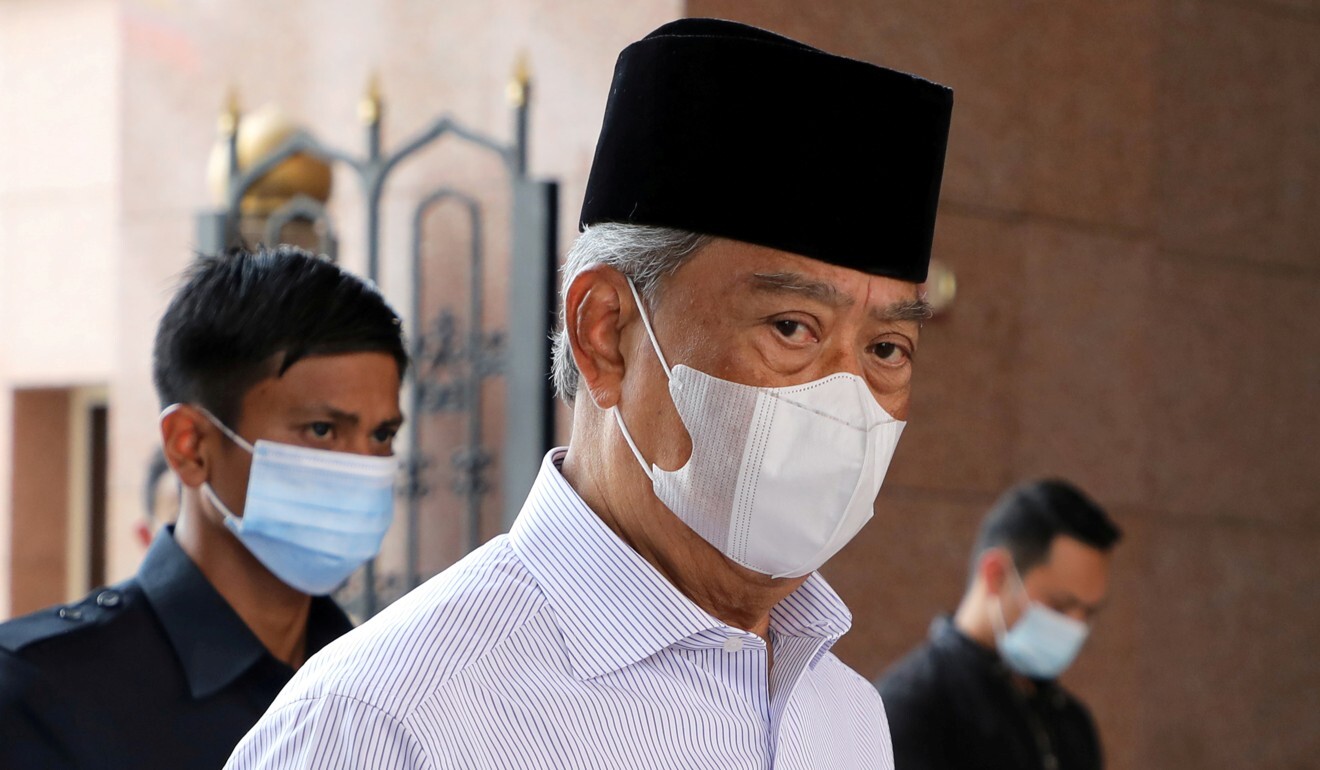
Amid coronavirus surge, Malaysia asks what went wrong as Muhyiddin and other politicians take brunt of criticism
- Three months after an initial strict lockdown ended, the country faces a sharp uptick in Covid-19 cases
- Politicians who campaigned in Sabah elections, and the prime minister, are being blamed for the return of the virus to the peninsula
In early July, Malaysian Prime Minister Muhyiddin Yassin was flying high, considering the circumstances.
After a gruelling March-to-May lockdown that ground Southeast Asia’s third-largest economy to a near standstill, daily new infections had come down to below 20.
Three months on, however, a new surge is well under way, giving rise to fears that a fresh lockdown – while economically debilitating – may once again be crucial to curbing new daily infection tallies, which are currently in triple digits.
Sabah election spurred Malaysia virus surge, says prime minister
On Tuesday, the total new cases tally count hit a record 691, with a bulk of the cases occurring in the Peninsular Malaysia state of Kedah, and in Sabah, one of two states in Borneo. Latest figures showed 354 infections reported on Friday and 2,951 new cases this week, or about 20 per cent of the country’s total count of 14,722 since the pandemic began.
Also causing worries is the situation in the country’s prisons, with inmates and prison staff now make up over 8 per cent of all cases.
Indeed, on September 7, the Ministry of Health revealed that of the 62 cases reported that day – the highest at that point since June 4 – 50 involved individuals in an immigration detention facility in Sabah.
But across the country, elections in Sabah on September 26, and election campaigning before that, are seen as the key drivers of the new surge.
Malaysia can’t afford new lockdown, say experts as Sabah cases surge
Muhyiddin acknowledged earlier this week that the Sabah vote was a factor in the latest coronavirus surge, but he also suggested that the elections were unavoidable, given the stipulation in Malaysia’s constitution that once a state assembly is dissolved, elections must be held within 60 days.
Critics have countered that it was the prime minister’s camp that had set out to topple Shafie’s administration in the midst of the pandemic. They also pointed out that the way some campaigning was done may have led to the jump in Covid-19 infections.
While politicians agreed to abide by guidelines mandating social distancing and the wearing of masks, images on social media showed dozens of instances where candidates and other campaign officials mingled with citizens in close quarters and at times with their masks below their chins.

The government made it mandatory for those returning from Sabah to Peninsular Malaysia to be tested on September 27, a day after the elections. While health guidelines suggested that even those who tested negative should observe 14 days of self-quarantine, members of the public decried that politicians were not following the advice.
Political analyst Azmil Tayeb said he understood why public anger against the government was on the boil. The public perception was that it was the “politicians, with reckless disregard for the virus by not wearing masks and maintaining social distance, who brought back the virus to the peninsula,” Azmil said.
Further fuelling the public ire was the prime minister, who came under severe criticism on social media this week after a live address in which he quipped that Abah (a Malay-language term of endearment meaning “father”) now had to “use the rotan” – in reference to a cane commonly used for corporal punishment in Southeast Asian households – on people who refused to wear masks or breached social-distancing measures.
“It’s understandable why people are so angry at the politicians, and Muhyiddin’s recent announcement only makes it worse,” Azmil said.
Mahathir upbeat about Malaysia’s coronavirus recovery
A tabulation by the local news portal Malaysiakini this week showed that eight politicians – seven from Muhyiddin’s camp – had contracted the virus after campaigning in Sabah.
The prime minister, along with seven ministers, six deputy ministers and Noor Hisham Abdullah, Malaysia’s director general of health, are currently in home quarantine after they met in close quarters last weekend with Religious Affairs Minister Zulkifli Mohamad al-Bakri, who is among those infected.
Public health experts told This Week in Asia that the entire episode was emblematic of how the country collectively appeared to have learned little from the outbreaks earlier in the year.
Zulkifli Ismail, secretary general of the Asia Pacific Paediatric Association, said that while the gathering, which was organised by the Islamic missionary movement Tablighi Jamaat, occurred at a time when citizens and authorities had few clues on how the virus spread, there was no excuse this time round.
Malaysia: Anwar pans Muhyiddin’s Covid-19 economic rescue plan
“The Sabah election occurred when we knew a great deal more and yet those responsible were still reckless enough to carry on with the campaigning and elections,” Zulkifli said. “We hear our leaders talk about the new normal, but are we willing to put it into practice? If we are, we can control the spread.”
Jahizah Hassan, president of the College of Anaesthesiologists at the Academy of Medicine of Malaysia, said the failure of various “politicians and leaders” to follow standard protocols for Covid-19 prevention during and after the election was disappointing. “The virus cannot differentiate between leaders and the [citizens], or election dates and normal dates,” Jahizah said.
As to what happens next, public health experts acknowledge that the country’s economy would not be able to withstand another full-scale lockdown. Total unemployment stood at 4.7 per cent in July, a decrease from the record high of 5.3 per cent in May, but still higher than the country’s usual unemployment rate of just over 3 per cent.
Can Malaysia’s Muhyiddin see out the year as prime minister?
The government is projecting that the economy will contract anywhere from 3.5 per cent to 5.5 per cent this year. Malaysians, meanwhile, are hoping there won’t be any fresh turmoil in the country’s politics, after the Sabah elections.
Still, there are murmurs that the opposition Pakatan Harapan alliance is eyeing fresh manoeuvres to unseat Muhyiddin. The prime minister himself came to power after engineering the collapse of Pakatan Harapan – victors of the 2018 general election – in late February.
But Zulkifli Ismail, for one, said that for now politics needed to be put on the back burner because of the coronavirus resurgence.
“These ‘fluctuations’ occur when there is disregard for the science and standard public health advice,” he said.
“My personal view is politics should take a back seat during this pandemic, otherwise we will get more waves that will infect many more and kill a few along the way. The only way to beat this is for the whole community to be disciplined in following the public health guidelines … and this includes our lawmakers.”

